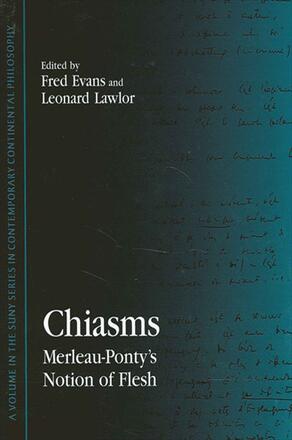
Chiasms
Merleau-Ponty's Notion of Flesh
Alternative formats available from:
Leading scholars explore the later thought of Merleau-Ponty and its central role in the modernism-postmodernism debate.
Description
Some of the best interpretations and evaluations of Merleau-Ponty's innovative notions of chiasm and flesh are presented here by prominent scholars from the United States and Europe. Divided into three sections, the book first establishes the notion of the flesh as a consistent concept and unfolds the nuances of flesh that make it a compelling idea. The second section adds to the force of this idea by showing how flesh can be extended to phenomena that Merleau-Ponty was not able to treat, such as the internet and virtual reality, and the third offers criticisms of Merleau-Ponty from feminist and Levinasian points of view. All the essays attest to the fecundity of Merleau-Ponty's later thought for such central philosophical issues as the bonds between self, others, and the world.
Contributors include Renaud Barbaras, Mauro Carbone, Edward S. Casey, Suzanne L. Cataldi, Tina Chanter, Françoise Dastur, Jean Greisch, Lawrence Hass, Marjorie Hass, James Hatley, Henri Maldiney, Linda Martin Alcoff, Berhard Waldenfels, Gail Weiss, Hugh J. Silverman, and Edith Wyschogrod.
Fred Evans is Associate Professor of Philosophy at Duquesne University and is the author of Psychology and Nihilism: A Genealogical Critique of the Computational Model of Mind, published by SUNY Press. Leonard Lawlor is Associate Professor of Philosophy at The University of Memphis and is the author of Imagination and Chance: The Difference Between the Thought of Ricoeur and Derrida, also published by SUNY Press.
Reviews
"This book offers important perspectives regarding Merleau-Ponty's difficult and unfinished conception of flesh, which is a concept of contemporary importance in solving—or posing—the debate between 'modernism' and 'postmodernism. ' I am convinced that the notion of flesh in Merleau-Ponty's work is important not only for Merleau-Ponty studies but for phenomenological studies in general; and for explicating the relevance phenomenology might have for the contemporary philosophical conversation. " — Jennifer Anna Gosetti, Villanova University
"The author addresses a topic that is crucial for assessing the direction and import of the work that was left unfinished when Merleau-Ponty died. It is central for understanding Merleau-Ponty's later work, and it bears directly on important issues in recent and contemporary philosophical work based in the European continental tradition. " — Wayne Froman, author of Merleau-Ponty: Language and the Act of Speech